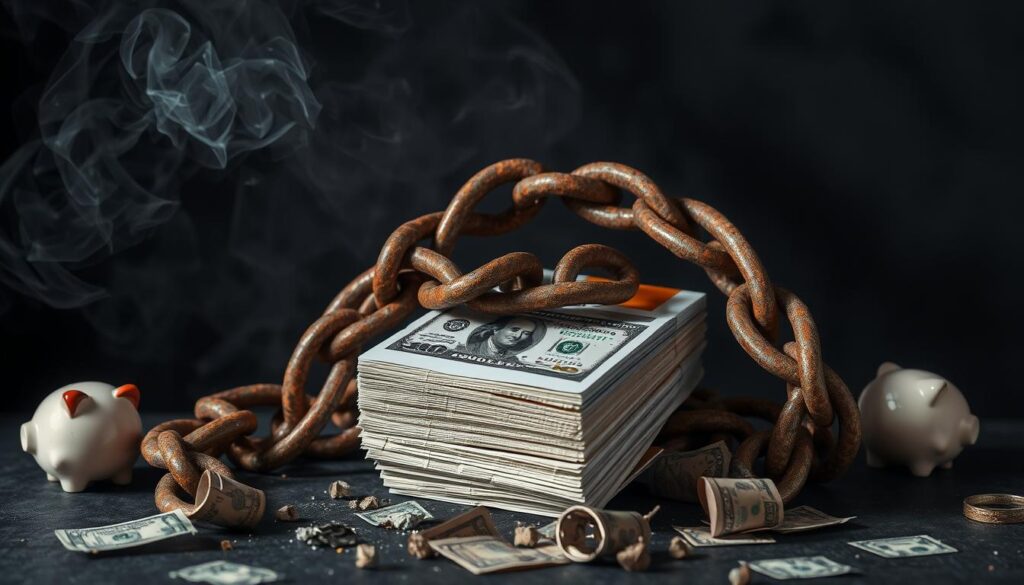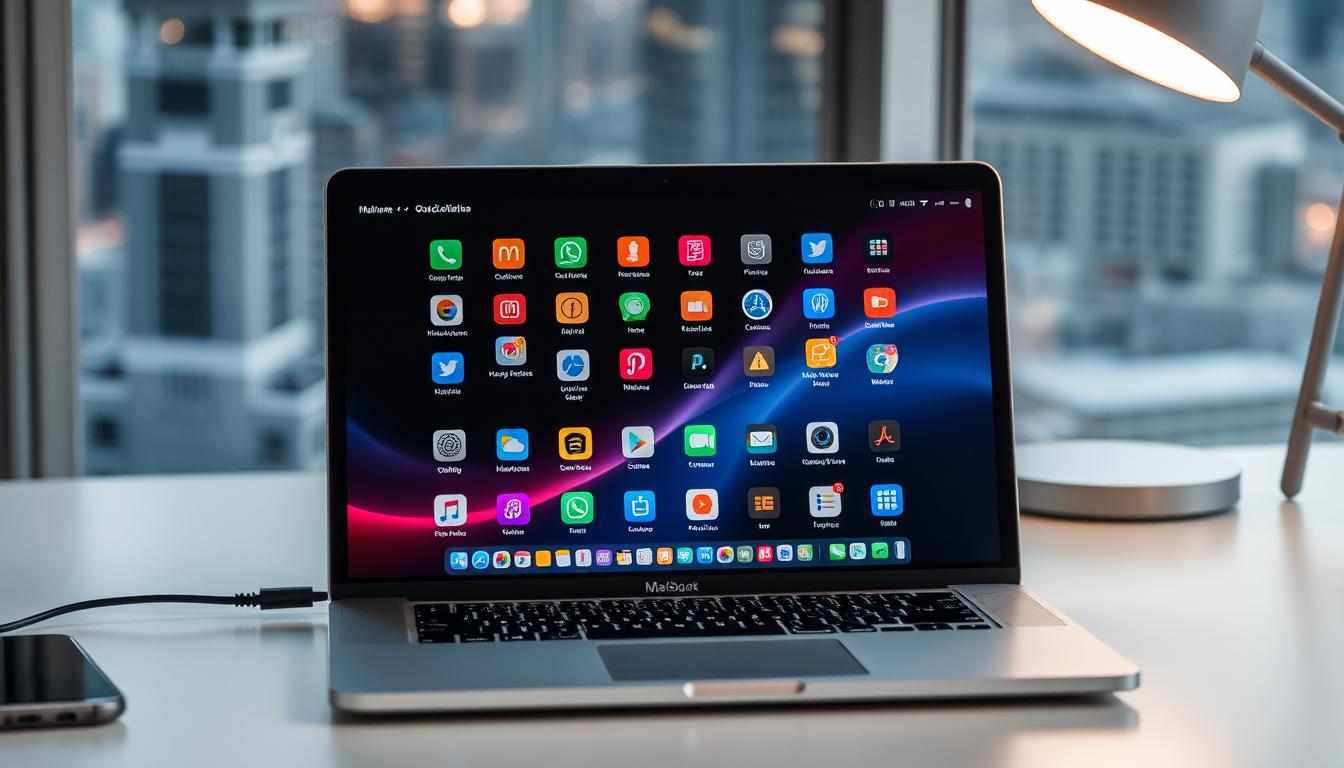Life often gives us choices that affect our money and health. Choosing to buy cigarettes might seem harmless, but it can lead to big financial problems. The cost of tobacco use goes beyond just the money spent on it. It includes health costs, lost productivity, and long-term economic effects on society.
Many don’t think about how smoking hurts our wallets and future security. The cost of cigarettes adds up, and so do health-related expenses. This article will explore how does tobacco use negatively impact personal finances, showing the full extent of its impact.
Understanding the Direct Costs of Tobacco Use
Looking at the financial impact of smoking, it’s key to understand the direct costs. Tobacco expenses and budgeting are vital for managing personal finances. The cost of buying tobacco products can quickly add up, affecting both monthly and yearly budgets.
The Price of Cigarettes
Cigarette prices vary by state and brand, but they’re always high. In New York, a pack costs over $13. If someone smokes a pack a day, they’ll spend more than $4,700 a year. This shows that tobacco costs are a big part of budgeting.
Cigars and Other Tobacco Products
Cigars and other tobacco products also increase the cost of smoking. A premium cigar can be $10 to $30 each. People who use smokeless tobacco or roll-your-own cigarettes also pay a lot. Including all tobacco products in the cost analysis helps us plan our budgets better.

Calculating Monthly and Yearly Expenditures
It’s crucial to see the monthly and yearly costs of tobacco use. Here’s how to calculate them:
- Determine your average daily tobacco use.
- Calculate the cost per day by multiplying the average daily use by the cost per unit.
- Find the monthly total by multiplying the daily cost by 30.
- For yearly expenses, multiply your monthly total by 12.
This simple method shows how much money tobacco costs. It helps in budgeting and seeing the financial strain from tobacco. Knowing the exact costs makes it important to manage these expenses well.
Health-Related Financial Consequences of Smoking
Tobacco use costs more than just buying cigarettes. It also brings health issues that affect your wallet. These issues include medical bills and higher insurance costs.

Medical Expenses from Smoking-Related Diseases
Smoking leads to serious health problems like lung cancer and heart disease. These problems can be very costly. Smokers often pay more for healthcare, including doctor visits and treatments.
Dealing with chronic conditions like lung cancer can be expensive. It can cost thousands of dollars. This puts a big strain on both the person and their family.
Insurance Premiums and Tobacco Use
Smoking also affects insurance costs. Insurance companies see smokers as high-risk. This means higher premiums for life and health insurance.
This can add up over time, making smoking even more expensive. Some insurance companies charge smokers up to 50% more than non-smokers.
How Does Tobacco Use Negatively Impact Personal Finances?
Smoking costs more than just buying cigarettes. It also leads to lost productivity and job loss, hitting our wallets hard. This makes it tough for individuals and families to manage their money.
Lost Productivity and Job Loss
Smoking harms our health, causing us to miss work and work less efficiently. We might need more breaks and longer time off for illnesses. This can make us less reliable at our jobs.
Employers might see smokers as less desirable, which could lead to losing a job or not getting ahead in our careers.
Financial Instability Due to Smoking Habits
Smoking habits can really drain our finances. Buying cigarettes or other tobacco products regularly eats into our monthly budgets. And, the medical bills for smoking-related illnesses add to the financial strain.
This cycle of spending can lead to debt, less savings, and long-term financial trouble. Smoking thus creates a big hurdle to financial security.
Economic Consequences of Smoking on Society
When we talk about how smoking hurts personal finances, we must think about its effects on society too. Smoking’s impact goes beyond just personal money issues. It affects public healthcare and productivity, leading to big economic problems.
Public healthcare systems spend a lot on treating illnesses from smoking. Governments use a big part of their budgets for these medical costs. This takes money away from other important services, putting a strain on healthcare.
Smoking also means lost productivity. Smokers often take more breaks and miss work due to health problems. This means less work gets done, hurting businesses and the economy. Studies say smoking costs the economy billions every year because of this.
Looking at the big picture, smoking’s effects are huge. It affects the economy and industries that need a healthy workforce. We need strong public health efforts to lower smoking rates and lessen these big financial losses.
- Healthcare costs drain public resources.
- Reduced workplace productivity affects economic output.
- Smoking increases absenteeism rates.
Seeing the big economic effects of smoking shows why we must tackle it. It’s not just a personal issue, but a big public health and economic problem that affects everyone.
Financial Burden of Quitting Smoking
Quitting smoking is a big step that affects your wallet. First, you need to know the costs of quitting aids and programs. These costs are high upfront, but you’ll save a lot later.
Investment in Quit Smoking Aids
When fighting tobacco addiction, we look at different aids to help quit smoking. The cost depends on the aid you choose:
- Nicotene Replacement Therapies (NRTs) like patches, gums, and lozenges.
- Prescription medications, such as Chantix or Zyban.
- Behavioral therapy and counseling sessions.
- Quit smoking programs and support groups, often provided by organizations like the American Lung Association.
Each aid has its own price tag. For example, NRTs cost $30 to $50 a month. Prescription meds can be about $100 a month without insurance. But, therapies and programs can help you quit for good.
Long-Term Financial Benefits of Quitting
Even with the upfront costs, quitting smoking saves you a lot of money over time. Here’s how your finances can improve:
- Reduced Medical Costs: Quitting means better health and fewer doctor visits, saving you money.
- Lower Insurance Premiums: Insurance companies often charge less for non-smokers.
- Increased Savings: You won’t spend money on tobacco products anymore, saving a lot each year.
- Enhanced Productivity: Being healthier can make you more productive and maybe even earn more.
In managing money with tobacco addiction, the initial cost of quitting seems high. But, the long-term savings make it all worth it. Quitting smoking not only boosts your health but also your wallet.
Managing Money with a Tobacco Addiction
For many, tobacco use can greatly affect their finances. To handle tobacco expenses and budgeting well, it’s key to use certain strategies. These strategies help manage costs without hurting your financial stability.
Budgeting for Tobacco Expenses
First, make a special budget for tobacco costs. Tracking your monthly tobacco spending helps you see where you can cut back.
- Keep a spending log to document each purchase and review it regularly.
- Set a fixed monthly amount for tobacco expenditures and allocate it within your overall budget.
- Consider using budgeting apps like Mint or YNAB to easily monitor and adjust your spending.
Strategies to Cut Down Costs
Reducing the financial burden of tobacco use means finding ways to lower costs. Here are some tips:
- Purchase tobacco products in bulk, which can offer per-unit savings.
- Switch to a less expensive brand without compromising on quality.
- Utilize coupons and look out for discount offers.
- Gradually reduce intake, thereby extending the longevity of your purchases.
By using these tips, we can better manage tobacco expenses and budgeting. This ensures our financial goals stay achievable, even with tobacco costs.
Conclusion
Tobacco use has big costs that hit our wallets and our economy hard. We looked at how buying cigarettes and other tobacco products drains our money right away. Then, we saw how smoking leads to high medical bills and higher insurance costs over time.
Our study showed how smoking hurts our wallets even more by making us less productive and even losing our jobs. This adds to the financial stress. Smoking also puts a big load on our health care system and our wallets.
Seeing the real costs of smoking shows how quitting can bring financial relief. Quitting means saving money with the help of quit aids. This makes a strong case for quitting to improve our financial future. By understanding the full cost of smoking, we can make better choices for our health and wealth.
FAQs
How does smoking impact personal financial health?
Smoking hurts your wallet in many ways. It costs a lot for tobacco, raises medical bills, increases insurance costs, and leads to lost work time.
What are the primary direct costs of tobacco use?
The main costs are what you spend on cigarettes, cigars, and other tobacco. Keeping track of this shows how much it adds up over time.
How can I calculate my tobacco expenses?
To figure out your tobacco costs, note how much you spend each month and year. Think about the total cost over time, not just the initial price.
What are the health-related financial consequences of smoking?
Smoking leads to higher medical bills for diseases like lung cancer and heart disease. Smokers also pay more for insurance, making things even tougher on the wallet.
How does tobacco use affect job productivity?
Smoking can cause you to take more breaks, get sick, and miss work. In bad cases, it might even lead to losing your job, really hitting your finances hard.
What are the economic consequences of smoking on society?
Smoking’s effects go beyond your wallet. It puts a strain on the healthcare system and lowers productivity at work. This hurts the economy big time.
How can I budget for tobacco expenses if I cannot quit?
If you can’t quit, plan your tobacco spending carefully. Look for cheaper options and find ways to cut costs without skipping important bills.


